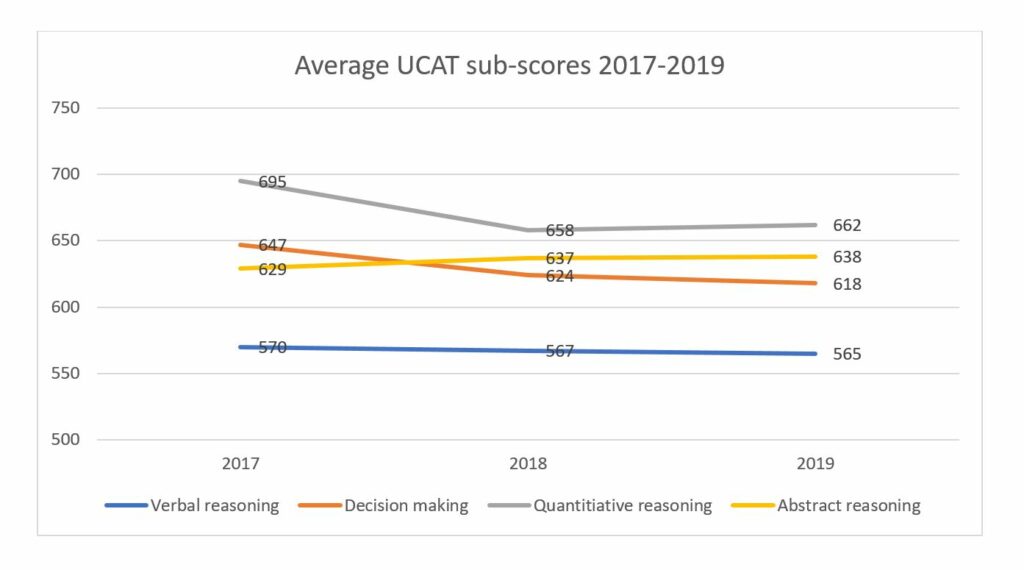Please be aware that the UCAT is undergoing major format changes in 2025. Primarily, the Abstract Reasoning Subtest will no longer be included in the exam. Please be aware of this when preparing for the UCAT and do not practice Abstract Reasoning questions as they are no longer relevant. Some of the information in this guide may no longer be relevant.
In our last hangout we gave you an expert breakdown and tips on the UCAT So now what?
It’s time to get down to business, smarten up and focus on your UCAT review with our “precision review” tips.
UCAT At A Glance
| Verbal Reasoning | Decision Making | Quantitiative Reasoning | Situational Judgement |
|---|---|---|---|
| 44 questions | 22 mins | 35 questions | 37 min | 36 questions | 26 mins | 69 questions | 26 mins |
| Evaluate written information | Make decisions based on complex info | Evaluate numbers and graphs | Assessing your judgment in scenarios |
What is a good UCAT score?
Each of the 4 “cognitive” sections are scored 300-900 and the SJT is scored bands 1-4, with 900 and band 1 the best respectively. You therefore end up with a total score out of 3600 and a band score for the SJT.
The graph below shows that the average UCAT score last year was 2483, or 620 per section. For the SJT, most students (40%) got band 2. However, we know that you’re not just wanting average- you’ve come to 6med so you want to excel!

The answer to “what is a good score” does depend on how the cohort has done, and this year all of the lockdown shenanigans may affect the average score (either up or down!) However, generally a score of 650+ (2600 total) is considered “good” and anything over 652.5 (2610 total) would have got you in the top 30% for the last two years!

UCAT TUTORING BUNDLE
Get UCAT support from 6med to score highly and earn your offer.
Prepare yourself for the UCAT with one-to-one tuition from a UCAT expert, as well as comprehensive resources, an expert preparation course and full access to UCAT.Ninja, available as soon as you sign up.
UCAT.Ninja
UCAT.Ninja
We've got all the tips and tricks you need to score highly on the UCAT.
Learn everything there is to know about the UCAT, with our UCAT Bundle and be guided by a tutor who scored in the top 10% – meaning you’re truly getting expert help.
Want to learn how to smash the UCAT, then this bundle is the one for you…


How do I get 650+ on the UCAT?
Now onto the meaty part: how to boost your score and zone in on weaknesses. Your first step is to make a study plan:
- Identify how many months before the test (generally, the more the better)
- Write down and organise your study plan (remember, consistency is always better than bursts)
- Stay disciplined: have a set working area, don’t get distracted and use active techniques like our fab UCAT Ninja.
Verbal Reasoning
Sifting through avalanches of texts is part of the charm of medical and dental school…sometimes. It’s a necessary evil and a good skill to learn. For verbal reasoning, you have to read a passage of text and respond in two possible ways:
- True/false/can’t tell question
- Single best answer question (most common type)
The 6med top tips here are to practise speed reading and practise the questions strictly under timed conditions. Also, experiment with different strategies: most students find reading the question first can help to pick out key info but it may also lead you to bias your thinking and look for certain words. If you get stuck, flag, guess and move on.
Statistically, students do the worst on verbal reasoning because they spend too long reading the text and can’t bear to flag the question and move on. We get it, you’re a perfectionist, but making up time here can get you marks elsewhere!
To save even more time, you can practise using the keyboard shortcuts Alt+ F to flag and (on the review screen) Alt + V to review the flagged questions only.
Decision Making
Every junior doctor and dentist needs to evaluate and assess information and make decisions on it. This is especially important when you consider objective, critical analysis is used in this section- in other words, don’t bring in your own knowledge or biases!
This section covers:
Deductive reasoning
- Syllogisms (two statements, analyse the link between them)
- Logical puzzles (tip: draw or write out the problem)
Evaluating arguments
- Interpreting information
- Recognising assumptions
Figure analysis
- Probability
- Venn diagrams
With such a mix of words, numbers and formats this section can present some challenges- it’s therefore so important to practise the question types and see which ones you struggle on. Some of these can take a while as well so make sure to flag, guess and move on if you see a particularly tricky one!
Quantitative Reasoning
Calculating the dose of morphine or anaesthetic needed for a patient requires a decent command of numbers. Plus, if you’ve tried to follow the Covid-19 briefings without knowing how to properly interpret graphs, you’ve probably found just how important it is!
This is statistically the best scoring section on average, but some students waste time here by not practising mental maths and not using estimation– often you can narrow down the answer just by rounding up/down and estimating the range of numbers you’ll be dealing with for the answer.
They do provide you with a calculator (Alt + C = keyboard shortcut) but it’s a but clunky and slow to use and should be there if you’re desperate. Whether you’re sitting the UCAT at home or at a centre you’ll have access to a whiteboard which can be very useful here.
The problems with this section are some people are not “mathsy” and there are numerous sub-skills needed (spatial/shape awareness, ratios, conversions, mental maths, graphs etc.). The best thing is to try the different question types and quickly identify what you’re weakest at, and then zone in on that.
Make sure to zone in on which of the following sections you’re weakest at:
- Speed, distance and time
- Percentages
- Ratios and proportions
- Conversions
- Probability
- Tables and diagrams
- Geometry
Also, remember you’ll get a combined score so if you really don’t have a maths brain and have practised to the point of dreaming about graphs, but still aren’t hitting high scores, you can always use the flag, guess and move on tactic and make up the score on a stronger section.
Situational Judgement
This is the only “non-cognitive” section and actually represents a slightly easier form of the SJT exam you’ll (hopefully) be doing for medical/dental finals! The tip here is to identify what the problem is and how best to solve it in a “textbook” manner- i.e., it may not be what you’d actually do, but is what you should do if you were talking to a supervisor or consultant about it. Your answer will be compared to an “expert” panel so even if you disagree with the answer, you’re probably best off listening to what they say.
The best thing you can do is check out our next Hangout on our homepage, where we will break down the format, what to know and key strategies for answering every question type.

UCAT TUTORING BUNDLE
Learn everything you need to know for the UCAT with 6med.
When you sign up to 6med’s UCAT Tutoring Bundle, you’re getting access to world-class support for medical students who succeeded in the test!
UCAT Crash Course
UCAT Crash Course
Looking to dramatically boost your UCAT Score?
When you sign up to 6med’s UCAT Bundle, you’re getting access to live courses, video Masterclasses, an expert workbook and UCAT.Ninja, the world’s best UCAT preparation platform!
Does this sound like the perfect UCAT preparation support?

